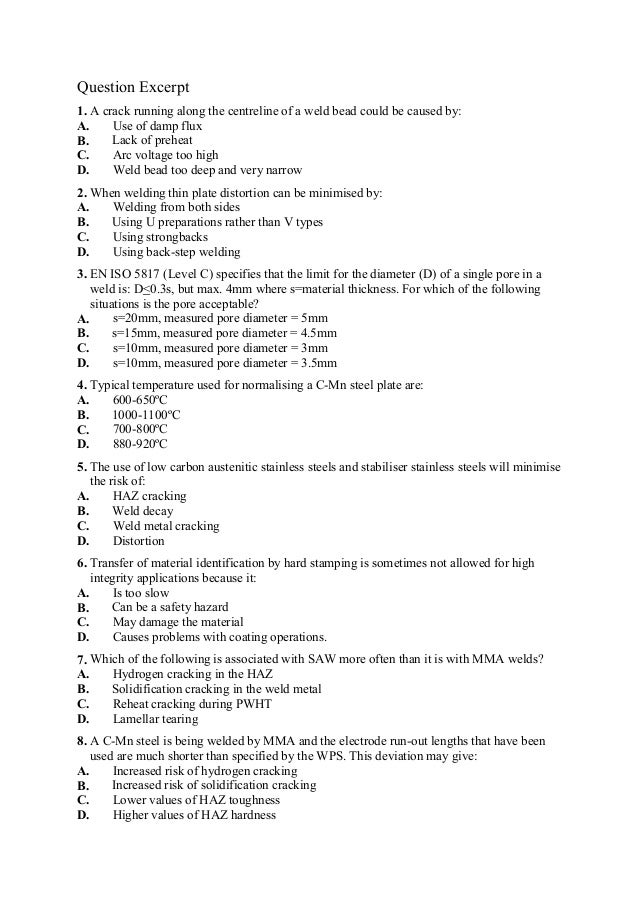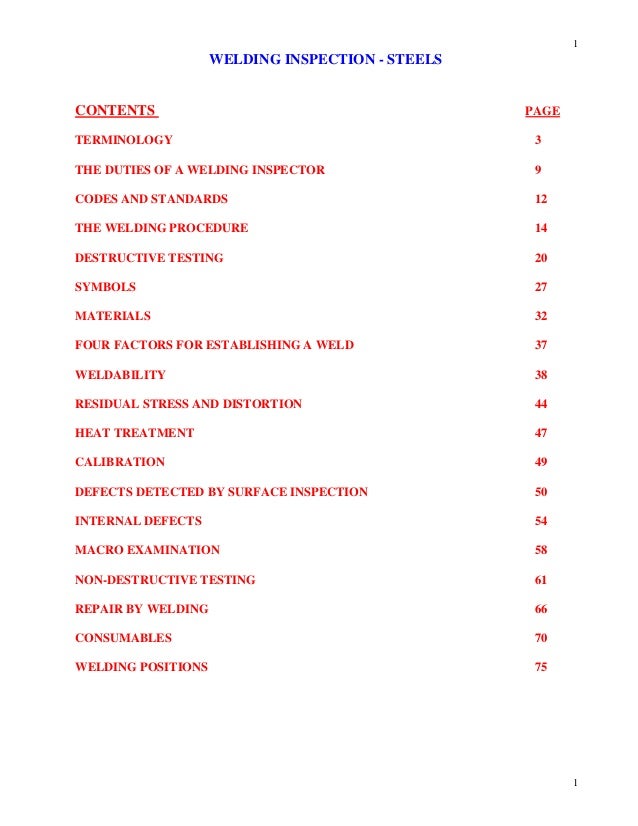Generally, the future direction being targeted is that; the content of the first level course is being adapted in recognition that many of the students do not have a general engineering background, the courses are being modified to include a greater practical component, the supporting examinations are also being revised to include a more comprehensive assessment of practical skills, the course structures are being adapted to make use of the full range of IIW inspector qualification levels (Basic, Standard and Comprehensive) and the certification of inspectors will be introduced and will be based on IIW qualifications.
- Welding Inspector Level 1 Exam Papers Pdf
- Welding Inspector Level 1 Exam Papers Pdf
- Welding Inspector Level 1 Exam Questions
- Cwb Welding Inspector Level 1 Exam Questions
- Welding Inspector Level 1 Exam Papers Fbise
Some of the changes needed to meet the targets will be introduced from the beginning of 2014.
Training Course Content and Examinations
Examination Forms. Note: For Discipline Certification Forms navigate to the required discipline from the home page. FOR-CER-14 Re-sit NDT Examination; FOR-CER-16 Re-sit Inspector Examination; FOR-CER-07 Re-Mark Examination Paper; FOR-CER-08 Review Examination Paper; Other Forms. FOR-CER-06 Application for Recognition Other Qualifications. The Certified Welding Inspector certification is more than a rewarding career. It involves great responsibility and remarkable skill demonstration. The CWI® is widely recognized, both nationally and internationally, and successful companies have come to rely on this AWS certification when ensuring the highest level of quality workmanship. Choose from 10 welding inspector level jobs on South Africa's biggest job offers site. Find your next opportunity and apply today! Matric own transport computer literate awsi level 2 qualified iso 9001 experience 1-2 years aws d1 welding. Review welder qualifications, test reports / qualify welder. Transition from BGAS Welding Inspector to PCN Weld Inspection Level 2 A transitional arrangement has been agreed whereby BGAS/CSWIP Welding Inspectors, certificated under arrangements described in document BGAS/ER1 dated May 1999, may attempt a bridging examination and, if successful, be awarded a PCN certificate for Weld Inspection at Level 2. In the case of visual examinations of welds the plastic replica examination requirements will go a long way to ensure that inspectors are prepared for their visual inspection responsibilities. IIW Welding Inspector Qualifications. The existing formats of the level 1 and 2 welding inspector programmes have been in place for several years.
At the behest of industry, SAIW has been investigating how it can improve the background knowledge of newly qualified inspectors. It has been decided to introduce a module 0 course which addresses basic fundamentals in preparation for the main course content. The module is one week in duration and is taken from the IIW programmes for inspectors and specialists. It has the course content shown in Table 1 below. It should be understood that the content is only covered at a basic and simple level. There was discussion within the SAIW committee structure about whether or not the module should be mandatory for all candidates. It was decided that in certain cases exemption from module 0 may be granted upon application.
The introduction of module 0 means that from January 2014 the level 1 course will be extended to five weeks from the current four weeks.

Table 1: Module 0 Course Content
Subject | Objective | Duration |
Basic Metrology applicable to welding | To ensure a basic knowledge of metrology to control quality of welding | 4 |
Technical Calculation | To demonstrate how to make calculations related to welding | 8 |
Technical Drawings | To be able to read and understand basic technical drawings | 8 |
Basics of Electro-technology | To acquire a basic knowledge of industrial electricity related to welding | 2 |
Basics of Chemistry | To acquire a basic knowledge of chemistry in relation to the welding process | 2 |
Basics of Materials | To be informed about the main metallic materials used in welding | 2 |
Metal Products | To know different product forms and understand their methods of production | 2 |
Machining of Materials | To be informed about the methods of machining ferrous and non-ferrous alloys | 2 |
Technical Mechanics | To be able to make simple calculations of forces in welding | 4 |
Joining Elements | To be informed of non-welding joining methods | 2 |
Calculation of Strength | To appreciate tensile test diagrams, moments of inertia, section modulus, simple stress calculations | 4 |
TOTAL | 40 |
The level 1 and 2 courses are being further modified to incorporate more practical training especially for welding processes, mechanical testing, non-destructive testing and metallurgical examinations. More demonstrations (or DVD viewings in remote centres where this is not possible) have been included in the syllabus. An especially important change to the practical classes will be the introduction of plastic weld replicas which will be used to improve training for visual examination of welds.
Examination formats are changing to reflect the revised course structures and Table 2 below shows the new requirements. The main changes are the re-introduction of radiographic interpretation and the evaluation of plastic replica welds.
Table 2:Examination Formats
Level 1 Welding Inspector
Theory Paper (Closed Book Paper) | Practical Application (Open Book Paper) | Practical Examination |
Duration 2. 5 Hours | Duration 3 hours | Duration 4 hours |
The purpose of this examination is to test the student’s knowledge of the fundamentals of welding and inspection. These fundamentals include:
| Typical questions can range from the following:
| The practical examination paper will cover the following:
|
Level 2 Senior Welding Inspector
Theory Paper (Closed Book Paper) | Practical Application (Open Book Paper) | Practical Examination |
Duration 2.5 Hours | Duration 3 hours | Duration 4 hours |
The purpose of this examination is to test the student’s knowledge of the fundamentals of fabrication and inspection. These fundamentals include:
| Practical application for the use of Manufacturing Codes and Standards, e.g.: Range of Welding Procedure qualification according to:
Pressure Equipment Regulations, Mines and Works Act and Pressure test Calculations from international codes Tolerances for Pressure Vessels | Review and evaluation of the following NDT reports:
Viewing of 3 (three) radiographs and identifying the various type of discontinuities Review and evaluation of Welding Procedures, 1 off:
|
The respective responsibilities of the various parties in radiographic interpretation have long been the subject of debate – the roles of the welding inspector, the NDT operator and IPEs! The SAIW committee structure has held the view that interpretation is not a responsibility of the welding inspector, this lays with the RT NDT level 2 personnel and the IPE (who is required to hold Radiographic Interpretation certification) since both are appropriately certified. Even so there is a general expectation that a welding inspector should recognise obvious defect situations.

In the case of visual examinations of welds the plastic replica examination requirements will go a long way to ensure that inspectors are prepared for their visual inspection responsibilities.
IIW Welding Inspector Qualifications
The existing formats of the level 1 and 2 welding inspector programmes have been in place for several years. The combined courses are aligned to comply with the IIW Standard Level requirements. Anyone successfully completing both levels 1 and 2 and meeting the IIW access requirements is awarded the IIW diploma.
Many inspectors meeting IIW access conditions obtained their SAIW Level 2 qualification before the full alignment with the IIW Standard Level qualification. These inspectors are able to attend the Construction and Design training module and sit the supplementary examination to obtain the IIW Standard Level qualification diploma.
Welding Inspector Level 1 Exam Papers Pdf
To encourage welding inspection managers and technical experts to improve their qualifications, the IIW Comprehensive Level diploma programme is being introduced from next year and two courses are being included in the schedule for next year. There are two routes of entry to the Comprehensive Level qualification; either by direct access with higher level educational qualifications or via progression from Standard Level with two years of practical experience. The training course requirements vary for the two routes of entry and in the first instance it has been decided to focus on inspectors wanting to progress from Standard Level. The course will be four weeks in duration and more details will be published early in the New Year in the SAIW’s newsletter, Fusion, and on the SAIW website.
IIW is currently conducting a major review of its inspector programmes and when this is complete it should be possible to make use of the full range of IIW courses including the IIW Basic Level which has been run on an ad hoc basis in the past.

Welding Inspector Level 1 Exam Papers Pdf
Please note there may yet be inspectors who are entitled to IIW diplomas under transition arrangements (see Fusion edition of August 2012 – available on website).
Welding Inspector Level 1 Exam Questions

Cwb Welding Inspector Level 1 Exam Questions
Certification of Welding Inspectors
Welding Inspector Level 1 Exam Papers Fbise
Generally, our industry experts have advised that it is important that inspectors with experience are given recognition and the best way to do this is through a welding inspector certification programme. Details of the certification system are currently being addressed by a scheme committee and the planned launch date is July 2014. More information will be published as details are confirmed over the next few months.
